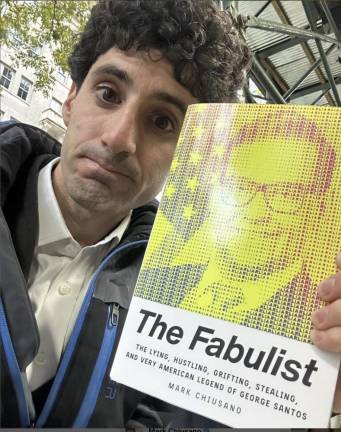Tangoing with Author of “The Fabulist” on the Rise and Fall of George Santos


When it was announced last February that Mark Chiusano was writing a book about the then-Congressman George Santos—the MAGA-loving man of a thousand faces, few of them true—I must admit, I was less than wholly enthused.
Chiusano himself was terrific: a Brooklyn-native author of the cult classic, Marine Park, a 2014 collection of short stories, who earned wider acclaim as a journalist, first at the city freebie AMNewYork, and then at its then-parent Long Island daily paper, Newsday. A dogged reporter and talented columnist, Chiusano has often shown a sharp eye for the workaday grit of local politics.
The problem was his subject, whose character seemed too odious to tolerate. While Santos is certainly unique—name another gay Brazilian Catholic “Jew -ish” cross-dressing ex-college volleyball star (or so he’d claim) from Queens—who really wants to read about this guy, again, at length? He’s a liar, a bully, and an alleged thief, including from his own fraud-mired dog rescue “charity,” Friends of Pets United. Fine, I get it: goodbye! But is that really a book?
I was wrong, and “The Fabulust: The Lying, Hustling, Grifting, Stealing, and Very American Legend of George Santos” from Atria/One Signal Publishers, an imprint of Simon & Schuster, is a fabulous, sizzling and sometimes sassy book, excelling both as real-time reportage and an incisive review of the time and places that made the rise and fall of George Santos possible.
Were people eager to talk to you?
I talked to over 100 people who knew Santos for the book, so lots of people were happy to share their thoughts about their bizarre interactions with Santos.
Even though you detail this perfect storm of political events, both locally and nationally, that enabled his victory, for those who only know Santos as a caricature, it’s shocking he had the competency to run a campaign and attend to all the details that requires. Is there any single person to credit or blame for his success?
He himself became a savvy and clever campaigner. He could really win over audiences. But he had the help of much of the mighty Long Island GOP infrastructure, and it was a year that that infrastructure was humming on Long Island, from Lee Zeldin [the Republican gubernatorial candidate who ran a closer than expected race against Democrat Kathy Hochul] on down.
Is there a comeback road for Santos? If not politically, then professionally. Since he’s still active on social media and still riding Trump coattails, that suggests he doesn’t count himself out.
He has real legal challenges ahead [Santos faces 13 criminal charges including fraud, theft of public funds, money laundering and making false statements to Congress] but also an ability to leverage his 15 minutes of fame into appearances on the lower scales of America’s celebrity culture—think Dancing with the Stars or the Cameo videos he’s already doing. He’s also very good on podcasts and I could see him riding the Trump bandwagon on that front as well.
Were there any political books which inspired you to make the move from deadline-driven beat reporter to non-fiction book writer?
Yes! I love Richard Ben Cramer’s “What It Takes” for the way it can get into candidates’ heads, as well as all of Robert Caro’s work, for the way he pulls back to look at social and historical forces that drive the lives of politicians and voters.
Reading “The Fabulist,” I was reminded of two classic crime books by journalists—”Wise Guy” by Nicholas Pileggi, and “The Good Rat” by Jimmy Breslin. The protagonists in both are career criminals—Henry Hill and Burton Kaplan, respectively—with real talents, but who are addicted to the criminal lifestyle. At a certain point, however, their continuous scamming is more work, and much more dangerous, than legitimate work would have been—thus their downfalls. Could Santos have straightened up and made a good living in finance or some other industry?
By the way, Breslin is another model for me, one of my favorites. The way he can disappear into a story when he needs to. I definitely think Santos could have made a living elsewhere. He was good at his call center job at Dish in Queens—he could have worked his way up the ranks. But he was far too impatient for anything like that.
Tell us about Santos and 9/11?
This is one of those stories that shows how hard it is to prove a negative. I went down a rabbit hole trying to see if Santos’s mother (who died in 2016) could possibly have been present on 9/11. Her own visa paperwork suggests she wasn’t, and certainly she was not a financial executive, as Santos claimed in one campaign bio, adding that she was “in her office in the South Tower” on that awful day. No one I talked to could verify anything about a fancy Wall Street job for her.
Santos has also made similarly questionable claims about his “Jewish background.”
The Jewish backstory was another wild ride. He would shift it over time, ultimately to the point of literally describing himself as a nonobservant Jew. He certainly seemed to tell such yarns to Jewish audiences and outlets, in what seemed like a way to curry favor.
Santos the gay, drag-friendly, Brazilian is such an amazing story, especially for a Republican. Were Santos’ former friends and associates in those scenes surprised at what he became?
Some of his old friends, particularly from Brazil, felt that his final stances on LGBTQ issues represented a betrayal. Certainly he seems to have embraced drag dressing in a way that was liberating and enjoyable to him, at least when he was a teenager. One of my favorite parts of the reporting for the book was watching a performance by his drag mentor in Rio, to get a better understanding of what he learned and how he acted back then.
You conclude by stepping outside the Santos narrative with an analysis of the problems of getting good candidates in the current political and media climate. Let me flip the script from Santos to New York City generally, most of which labors under less-than-responsive, one party, Democratic rule, and whose elections have generally abysmal voter turnout.
What can be done to get us past the echo chamber on both sides, the culture war right and the hashtag left, and make more people feel they have a stake in their candidates, and the political process?
More engagement is a great thing! I’ve always loved experiments like “participatory budgeting” which give voters more of a role in governance (in PB’s case, that means voting on good local projects that should get city funding).
In addition to your career as a journalist and non-fiction writer, you are the married father of a beautiful, rambunctious, toddler. For those of us who are behind schedule on this or that creative project, how did you manage to do this book so well and on time?
I am very lucky to have an extremely supportive family who were the real heroes on this project—my daughter’s grandparents are her fulltime caregivers, which means I basically won the lottery in New York. And my wife Charlotte Alter was my editor and counselor from the beginning, and entertained my daughter while I was typing away or going to Rio drag clubs...